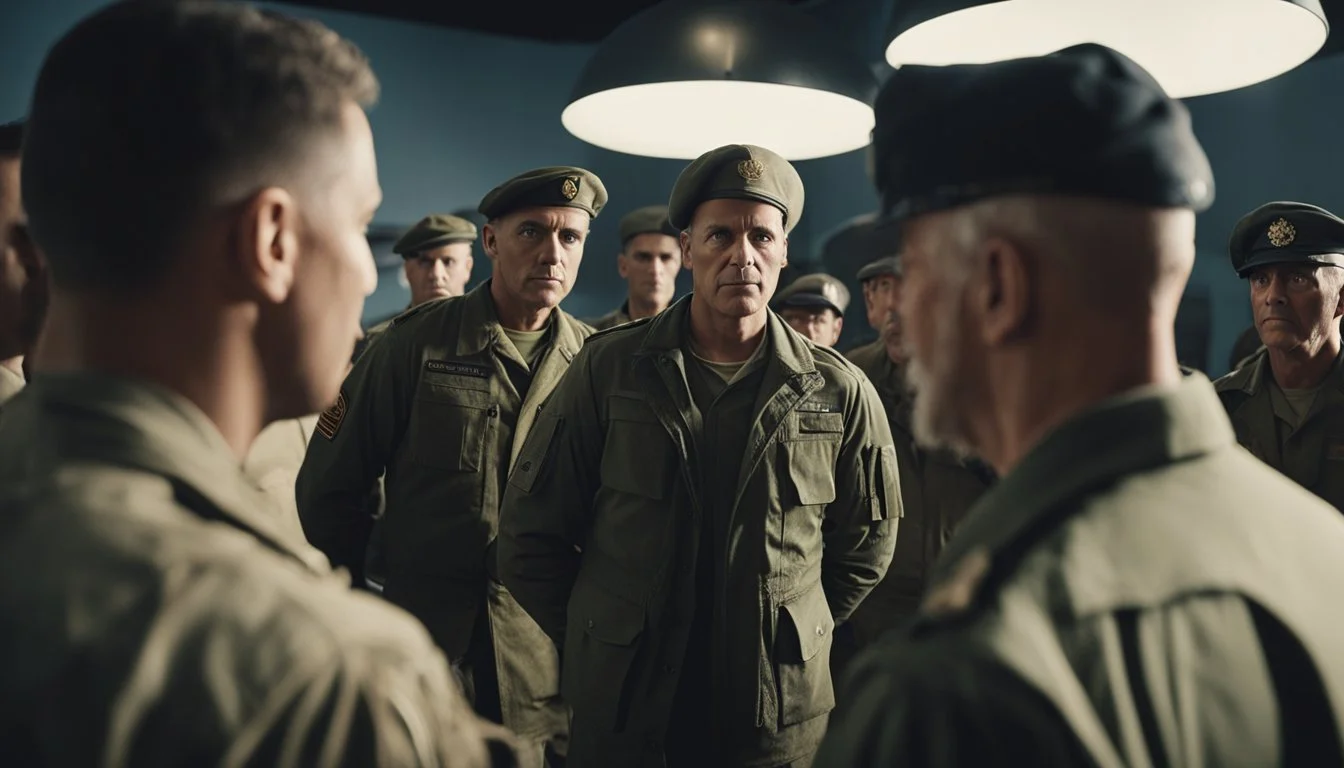Kazuo Hara Documentary Raises Questions About Filmmaker Involvement and Ethics
Kazuo Hara's 1987 documentary "The Emperor's Naked Army Marches On" pushes the boundaries of filmmaking ethics. The film follows Kenzo Okuzaki, a World War II veteran, as he confronts former soldiers about wartime atrocities. Hara's camera captures Okuzaki's aggressive tactics, including physical violence, raising questions about the filmmaker's role and responsibilities.
The documentary blurs the line between observer and participant, challenging viewers to consider whether Hara becomes an accomplice to Okuzaki's actions by continuing to film. This ethical dilemma is at the heart of the film's enduring impact and controversy. Hara's decision to remain behind the camera during confrontations has sparked debates about documentary filmmaking practices and the pursuit of truth.
"The Emperor's Naked Army Marches On" serves as a powerful exploration of post-war trauma, historical accountability, and the lengths some will go to uncover hidden truths. The film's unflinching approach to its subject matter has influenced subsequent documentarians and continues to provoke discussions about the role of filmmakers in dealing with sensitive historical and personal issues.
Contextualizing 'The Emperor's Naked Army Marches On'
'The Emperor's Naked Army Marches On' explores Japan's wartime past through the lens of one veteran's quest for truth. This documentary sheds light on hidden aspects of World War II and challenges societal norms in post-war Japan.
Historical Background
World War II profoundly impacted Japanese society. The conflict in the Pacific theater, including the New Guinea Campaign, saw Japanese forces suffer heavy losses. After Japan's defeat in 1945, Emperor Hirohito remained a controversial figure.
Many veterans struggled to reconcile their wartime experiences with post-war life. The government's reluctance to address war crimes created a culture of silence. This atmosphere of unresolved trauma and suppressed history set the stage for Kenzō Okuzaki's crusade.
Japan's economic recovery in the following decades further complicated efforts to confront the past. The nation grappled with questions of responsibility and remembrance.
Film Synopsis
'The Emperor's Naked Army Marches On' follows Kenzō Okuzaki, a 62-year-old veteran of the New Guinea Campaign. The documentary, released in 1987, chronicles his relentless pursuit of former military officers.
Okuzaki seeks answers about the unexplained deaths of two soldiers in his unit. His confrontational tactics include surprise visits and aggressive questioning. The film captures raw, often tense encounters with reluctant subjects.
Director Kazuo Hara employs a cinéma vérité style, allowing events to unfold naturally on camera. This approach raises ethical questions about the filmmaker's role and responsibilities.
The documentary exposes wartime atrocities and cannibalism among desperate troops. It challenges Japan's collective memory of the war and the emperor's role.
Kazuo Hara's Directorial Approach
Kazuo Hara's distinctive style challenges conventional documentary filmmaking. He employs a raw, unfiltered approach that blurs ethical lines and deeply engages viewers.
Documentary Filmmaking Ethics
Hara pushes ethical boundaries in pursuit of truth. He often inserts himself into scenes, becoming an active participant rather than a passive observer. This technique raises questions about objectivity and the filmmaker's role.
Hara believes in capturing raw, unscripted moments. He rarely stages scenes or conducts formal interviews. Instead, he follows subjects closely, documenting their actions and reactions in real-time.
This approach can be controversial. Critics argue it borders on exploitation, while supporters praise its authenticity. Hara's films often provoke discomfort, forcing viewers to confront difficult truths.
Portrayal of Kenzo Okuzaki
In "The Emperor's Naked Army Marches On," Hara's portrayal of Kenzo Okuzaki is unflinching and complex. He presents Okuzaki as a multifaceted character - a passionate activist and a troubled veteran.
Hara's camera follows Okuzaki's confrontational tactics without judgment. He captures tense interrogations and emotional outbursts, allowing viewers to form their own opinions.
The film blurs the line between documentarian and accomplice. Hara's presence arguably enables Okuzaki's more extreme actions. This raises questions about the filmmaker's responsibility to intervene or remain neutral.
Hara's approach creates a visceral viewing experience. The raw, unfiltered portrayal of Okuzaki engages audiences on an emotional level, sparking debate about war, justice, and personal responsibility.
Delving into Controversial Themes
"The Emperor's Naked Army Marches On" explores deeply unsettling topics from World War II. It confronts viewers with stark realities of war crimes, cannibalism, and the use of violence to uncover truth.
War Crimes and Accountability
The film exposes alleged war crimes committed by Japanese forces in New Guinea. Okuzaki relentlessly pursues former officers, demanding answers about executions of fellow soldiers. His quest raises questions about individual and collective responsibility for atrocities.
The documentary highlights the challenges of seeking justice decades after the events. It shows how some veterans maintained silence, while others struggled with guilt and traumatic memories.
Okuzaki's aggressive tactics blur the line between seeking truth and becoming a perpetrator himself. This ambiguity forces viewers to grapple with complex moral questions about accountability and the pursuit of justice.
The Moral Quagmire of Cannibalism
The film delves into horrifying allegations of cannibalism among Japanese troops in New Guinea. Facing starvation, some soldiers reportedly resorted to eating the flesh of executed comrades or even enemy combatants.
This taboo subject confronts audiences with the extreme measures taken for survival in wartime. The documentary explores how fear, desperation, and military hierarchy may have contributed to such acts.
Okuzaki's relentless questioning about these incidents reveals the deep psychological scars left on survivors. It also highlights the difficulty of reconciling such actions with societal norms and human dignity.
The Role of Violence in Testimony
Okuzaki's confrontational approach raises ethical questions about the use of force to extract information. He employs verbal abuse, physical intimidation, and even violence against those he interviews.
The film presents a moral dilemma: Can violence be justified in the pursuit of truth about past atrocities? It shows how Okuzaki's methods sometimes yield revelations, but also alienate potential witnesses.
This approach challenges viewers to consider the limits of acceptable behavior in uncovering historical truths. It also highlights the psychological toll of confronting traumatic memories and the complex emotions surrounding wartime experiences.
Public Reception and Critical Analysis
"The Emperor's Naked Army Marches On" sparked intense debate among critics and viewers alike. Its unflinching approach to confronting war crimes garnered both praise and controversy.
Reviews and Critic Opinions
Critics lauded the film's raw intensity and unflinching examination of wartime atrocities. Many praised director Kazuo Hara's hands-off approach, allowing Kenzo Okuzaki's passionate quest for truth to drive the narrative.
Some reviewers noted the ethical dilemmas posed by Okuzaki's aggressive tactics. They questioned the filmmaker's role in enabling potentially harmful confrontations.
The documentary's unpolished style divided opinions. Some saw it as authentic and powerful, while others found it difficult to watch.
Awards and Recognitions
"The Emperor's Naked Army Marches On" received several accolades from the film community. It won the Caligari Film Award at the 1987 Berlin International Film Festival.
The film was also honored at the Yamagata International Documentary Film Festival. This recognition helped cement its status as a groundbreaking work in Japanese documentary filmmaking.
In recent years, the documentary has been included in various "best of" lists. Film scholars and critics continue to study its impact on documentary ethics and techniques.
The Film's Legacy and Influence
"The Emperor's Naked Army Marches On" left an indelible mark on documentary filmmaking and Japanese society. Its unflinching approach to uncovering wartime atrocities challenged viewers and influenced future documentarians.
Influence on Documentary Genre
The film pioneered a confrontational style of documentary filmmaking. Director Kazuo Hara's uncompromising approach inspired later documentarians to pursue uncomfortable truths. His work with Shisso Production set new standards for investigative documentaries.
The film's impact extended beyond Japan. It paved the way for documentaries like "The Act of Killing" and "The Look of Silence," which similarly explored war crimes and their aftermath.
Hara's techniques of following subjects closely and capturing raw, unscripted moments became influential in the genre. His willingness to blur the line between filmmaker and participant raised important ethical questions for future documentarians.
Cultural Impact on Japanese Society
"The Emperor's Naked Army Marches On" forced Japanese society to confront its wartime past. The film sparked debates about historical responsibility and the treatment of veterans.
It challenged the prevailing narrative of Japan's wartime experience. By giving voice to Kenzo Okuzaki's quest for justice, the film exposed hidden aspects of military conduct in New Guinea.
The documentary's unflinching portrayal of Okuzaki's methods, including violence, sparked discussions about the limits of free speech and political activism in Japan. It pushed boundaries of what was considered acceptable in public discourse about the war.
The film's legacy continues to resonate in Japanese society, influencing how the nation grapples with its history and collective memory.
Further Reading and Resources
For those interested in exploring the ethical complexities of "The Emperor's Naked Army Marches On" further, several valuable resources are available.
Kazuo Hara's book "Camera Obtrusa" provides insights into his filmmaking philosophy and methods. It offers a deeper understanding of the director's approach to documentary ethics.
The documentary "Five Favorite Films" features Hara discussing his work, including "The Emperor's Naked Army Marches On." This resource offers valuable context from the filmmaker's perspective.
Abé Mark Nornes' book "Forest of Pressure: Ogawa Shinsuke and Postwar Japanese Documentary" includes a chapter on Hara's work. It provides critical analysis of the film's ethical implications.
For broader context on Japanese documentary traditions, Markus Nornes' "Japanese Documentary Film: The Meiji Era Through Hiroshima" is recommended reading.
Online resources:
MUBI's retrospective on Kazuo Hara
Asian Cinema Education Foundation's study guide on the film
Academic articles on documentary ethics in the Journal of Japanese Studies
These materials offer diverse perspectives on the ethical questions raised by Hara's controversial documentary approach.




